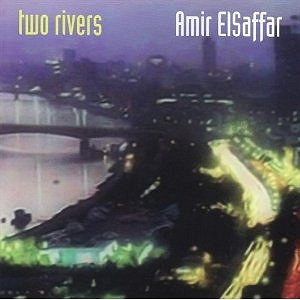By Diaa Bekheet

Two Rivers by Amir Elsaffar
I grew up in Egypt listening to traditional Arabic and Western music. Every Thursday, my family would watch “Kawkab El-Sharq” the Diva of Arabic music, Umm Kulthoum, on television, singing great poems by prominent Egyptian poets like Ahmed Shawqi, Hafez Ibrahim, Ibrahim Nagi, Ahmed Rami, and others.
Western pop was also very popular – songs by Bob Dylan, Michael Jackson, the Beatles, the Bee Gees – but Jazz, which was popular in the 1940s, was not really making any impact on the new generations. That didn’t happn until the 1990s, when some musicians, like Yahia Khalil and Fathy Salama, started to mix Arabic classical music with American jazz. Both Salam and Khalil studied jazz here in the United States.
Last week, I was pleased to see that the Middle East jazz scene visited the U.S. An Arab-America jazz sextet called Two Rivers appeared here in Washington at the Historic Lincoln Theatre. They celebrated “Turaath [Heritage]” of Arab Culture in America. The event showcases Arab art, dance, and music.
[audio:http://www.voanews.com/MediaAssets2/english/2012_12/jazz_beat_Amir_Elsaffar_twoRivers_diaa_bekheet_dec2012.mp3]
The Sextet has made innovative strides in using Arab music’s maqam modal system to transform the jazz idiom to create a sound distinct from other contemporary cross-cultural musical fusions. The music, which is deeply rooted in musical forms of Iraq and nearby regions, still speaks the language of swing, improvisation and group interaction.
Two Rivers began in 2006, when Iraqi-American trumpeter, santur player, vocalist, and composer Amir ElSaffar composed his Two Rivers, a suite of compositions combining elements of the Iraqi Maqam tradition with Jazz. The music received much acclaim, and Allmusic.com called it “as impressive a debut as we’ve had in America in the 21st century.”
I had a chance to talk with ElSaffar (mp3) who said he was commissioned by the Painted Bride Art Center, in Philadelphia, to compose a piece that combined the maqam and jazz.
[audio:http://www.voanews.com/MediaAssets2/english/2012_12/jazz_beat_Amir_Elsaffar_twoRivers_diaa_bekheet_dec2012.mp3]
Elsaffar said, “It was first a very daunting task. I was almost resistant to it because both are very distinctive traditions. But during the process of listening and trying to find a way to make them work I found some points in common between the two traditions. And at a certain level,” he concluded,“it actually made a perfect sense, and when I composed the first piece for the Two Rivers Suite it just came very natural the way that the pieces blended into each other.”
According to his official biography, ElSaffar continued to extend his compositional palette, creating a microtonal harmonic and melodic language that combines the pitch-flexibility of Middle Eastern music with jazz harmony. He composed another work, Inana, which has further expanded the sonic possibilities of jazz. The 2011 release of Inana received 4.5 stars from Allmusic and Downbeat, and was named #1 Jazz Album of 2011 in Time Out Chicago.
So far, Elsaffar and his group have released four albums: Maqams of Baghdad (2006), Two Rivers (2006), Radif Suite (2009), and Inana (2011).

One response to “Two Rivers Mixing Jazz with Traditional Arabic Music”
[…] more here: Two Rivers Mixing Jazz with Traditional Arabic Music – Voice of America (blog)Share this on del.icio.usDigg this!Stumble upon something good? Share it on StumbleUponShare this on […]